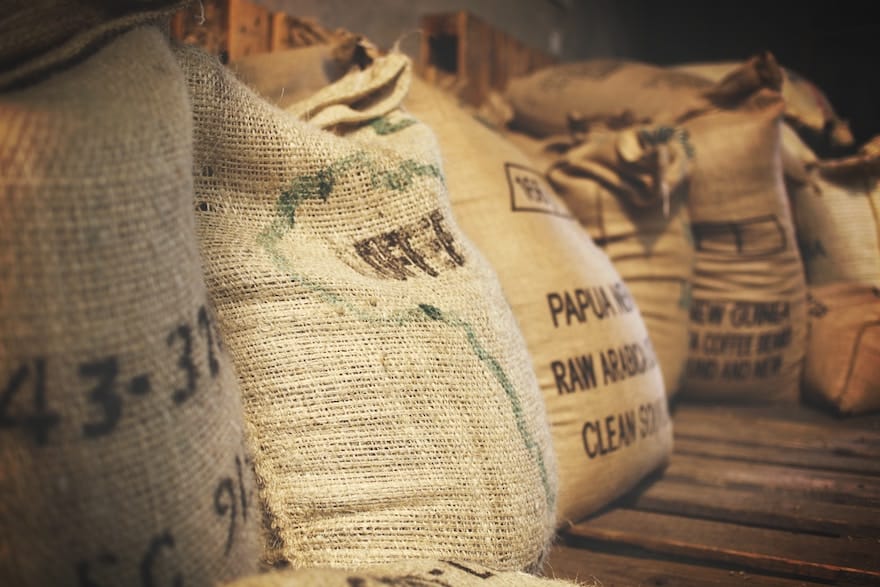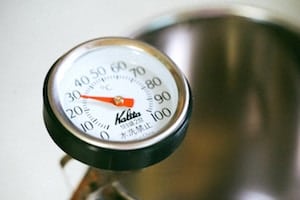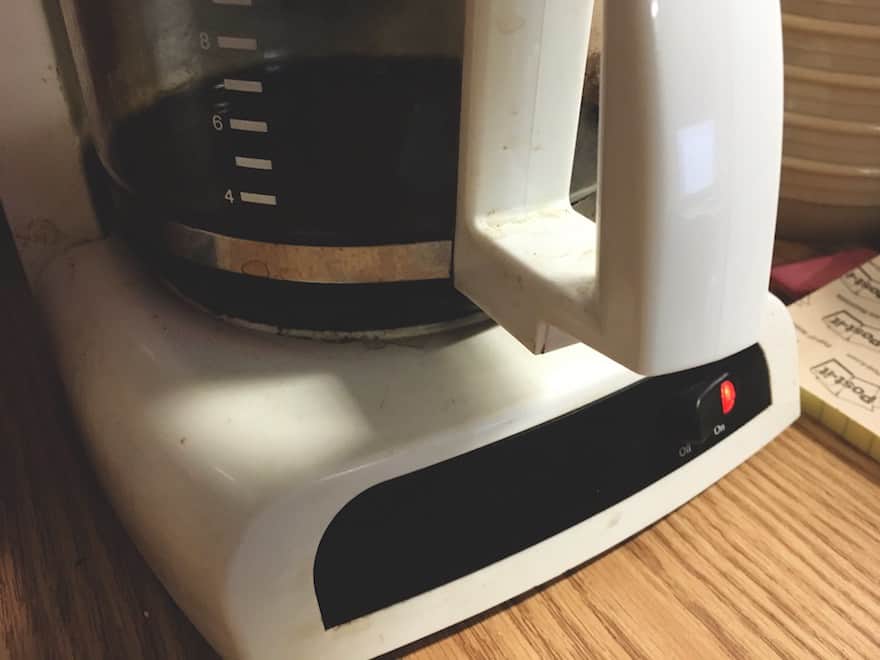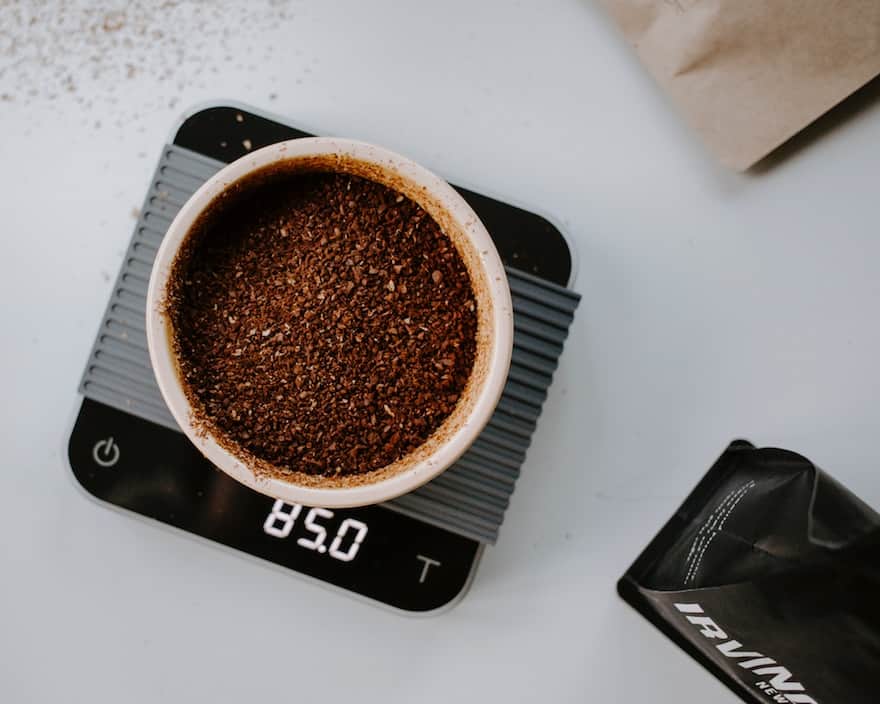Last Updated on November 5, 2023
If you love coffee, few things are more frustrating than brewing up a pot of coffee and discovering the coffee tastes bad in your coffee maker. And to make matters worse, it’s not always obvious where the problem lies.
Bad-tasting coffee usually comes down to one of four broad categories:
- a problem with your coffee
- a problem with the equipment you use to make the coffee
- the water you’re adding
- the process by which you’re making the coffee
The key to improving your coffee-making is to zero in on which of these areas is giving you the issue.
15 reasons your coffee might taste bad
1. This coffee isn’t right for you
First of all, consider the possibility that your problem with bad-tasting coffee is simply a matter of taste. Coffee comes in an incredible variety beans and roasts. You can find exotic, complex flavors or more ‘standard’ coffee.
What one person might consider perfect, another may find undrinkable.
The easiest way to identify if this is your problem is to try a variety of coffee types. If the coffee tastes bad across a range of coffee types, then there’s probably some underlying problem you need to address. If not, you just need to pick out a coffee that better suits your tastes.

2. Using the wrong equipment
It’s possible to get away with some improvisation when making your coffee. But if you don’t use the right equipment for the type of coffee you’re making, you increase the risk of bad-tasting coffee.
Specialty coffees like espresso or Turkish coffee require specialized gear. While you might be able to make do with generic coffee-making equipment in some cases, the safer plan is to use the correct equipment for the job.
This also goes for the cup you use to drink your coffee. Don’t drink coffee from a plastic cup. Use a ceramic, glass or stainless steel cup or mug at all times.
3. Brewing too much coffee and letting it sit
It can be tempting to brew up a huge batch of coffee for the day. But there’s a reason why the office coffee pot is never empty. Those dregs at the bottom are nearly undrinkable.
Over time, a brewed pot of coffee degrades in quality. You’re much better off drinking your coffee while it’s fresh. You’ll instantly notice the difference between the same type of coffee brewed fresh versus that coffee after it has sat for a couple of hours.
This means you ought to make smaller batches of coffee more frequently. This can be a bit of a hassle, but the difference in quality will be noticeable.
4. Beans aren’t fresh
It would be nice if coffee had an indefinite shelf life. But sadly, your coffee beans will begin to lose their flavor starting only a few days after they’ve been roasted.
Almost immediately after coffee beans are roasted, they begin to undergo a process called oxidation. This changes the chemical composition of the flavor compounds within the coffee. It makes the beans going stale over time.
The sweet spot for coffee beans is around four days to two weeks old. Any earlier and the coffee hasn’t yet developed its full flavors. Any later, and your beans are past their peak quality.
Try to buy coffee beans to your immediate usage patterns rather than buying a huge amount at once.
And keep in mind that ground coffee deteriorates even more quickly.
5. Water temperature is wrong

Making coffee might seem as simple as combining coffee beans with hot water. But the temperature of the water can make all the difference in how your coffee turns out. The proper temperature for making coffee is 205 F or 96 C.
If the water you use is over this threshold, you’ll boil off some of the oils that give your coffee its essential flavors. If the water is under the threshold, your coffee won’t be properly extracted. That will lead to a weak coffee with little flavor.
The fix to this issue is simple. Invest in a coffee maker with water temperature control or simply buy a thermometer and monitor your coffee water to make sure it’s the right temperature.
6. Timing is wrong
Tea drinkers especially can run into this problem when making coffee. With tea, there’s nothing wrong with steeping the tea bag for a few extra minutes. But when it comes to making coffee, your timing is far more important. If your coffee tastes sour or your coffee tastes burnt, this may be your problem.
The longer coffee brews, the more flavor is extracted from the beans. If you brew for too short a time, the coffee won’t have extracted enough and will be relatively tasteless. If you brew for too long, you’ll pull out too much flavor and could end up with excessively bitter coffee.
A rule of thumb is that you should brew coffee for four to 10 minutes. The exact timing will vary by coffee type and brewing method—about 30 seconds for espresso!—so experiment to find what’s right for you.
7. Using old or worn out equipment
No coffee maker lasts forever.
Its lifespan could be a couple of years. Maybe it will last for a decade or more. But at some point, your coffee equipment will break down or wear out.
Often, this is a problem you discover once every other option has been exhausted. Are you using the right water, fresh coffee beans, and recently cleaned equipment? If you’ve ruled out every other possibility, the issue may be that your equipment has worn out.
While it might be possible in some cases to fix worn-out equipment, in most cases the simplest solution is to replace it.

8. Using dirty equipment
Every time you brew coffee, residues collect in nearly every area of your coffee maker. Many people think they can get away with a simple rinse of the pot each time. This might work in the short term, but over time a variety of impurities will collect in your coffee maker. Eventually, this will impact the flavor.
This is especially true of little-thought-of areas of a coffee maker such as the reservoir of a drip coffee maker. But neglecting any area of the coffee maker will lead to problems if ignored for long enough.
Watch the video below to learn how to properly clean a coffee maker. And make it a rule to give your coffee maker a truly thorough cleaning at least once every five times you use it.
9. Using unsuitable tap water
Many people don’t spare much thought for the water they’re using to brew their coffee. This is a mistake. After all, water makes up the majority of your cup of coffee.
In many cases, you can immediately tell if the tap water you’re using isn’t suitable by tasting it directly. But some tap water may taste fine alone and still negatively affect the coffee’s flavor.
When in doubt, using a water filter is the best way to make sure your tap water isn’t causing an issue with your coffee’s taste. There are also a number of bottled waters suitable for brewing coffee.
10. Using too much coffee and not enough water
It may be tempting to heap big scoopfuls of coffee into your coffee maker. After all, more is better, right? Not in the case of coffee making, though.
If your coffee is too strong, this may be your problem.
Adding too much coffee relative to your water is a surefire way to make your coffee taste too strong and too bitter.
Most coffee makers come with instructions that indicate the desired coffee to water ratio. Keep in mind that different coffee makers have varying ratios. Have a kitchen scale on hand and measure your coffee out carefully. Then, add the exact right ratio of coffee to water.
11. Using low-quality coffee
Bargain shopping for coffee may help your pocketbook. But it can also negatively impact your coffee-drinking experience. It’s not always true that more expensive coffee will taste better than cheaper coffee. Many times, though, budget coffee won’t have the best flavor.
Obviously, you shouldn’t break your budget for top-shelf coffee if you can’t afford it. But even within a given budget, it’s possible to pick out better or worse coffee.
Talk to people who know coffee. Do some research online. You can find sources for high-quality coffees at a reasonable price.
12. The roast isn’t correct
You may be roasting your own beans. You may be buying from a coffee shop or grocery store. In any case, the issue causing your coffee to taste bad may be the roast.
It’s probably true that you’re more likely to run into this problem if you roast your own beans . This is especially the case if you are new to roasting. But store-bought coffee beans can have their problems, too. Any new batch of roasted beans is a new chance to mess up the roast.
If you roast your own beans, you can learn to get better and more consistent with your roasting technique. If you buy from a store and keep getting bad batches, consider switching to a new vendor.
13. The grind is too big
“Why is my coffee sour?”
If you’ve asked this question, you probably had a grind that was too coarse. If your coffee grounds are too large for the variety you’re brewing, you’ll end up with weak coffee that is under-extracted and a bit sour-tasting.
This happens because large coffee grounds have more volume in relation to the surface area that is exposed to the water. As a result, the water has to work harder to pull the flavors out of the grounds when you brew the coffee.

A too-large grind is especially likely to happen with types of coffee requiring exceptionally fine grounds. Turkish coffee is a primary example.
Grinding your own coffee beans is the surest way to make sure you don’t end up with too-large grounds.
14. The grind is too small
Conversely, if your coffee tastes bitter, this can be the result of too-fine grinding. When coffee is ground too finely for the brewing technique and equipment, the flavors come out quickly. The most bitter flavors are the deepest ones in the bean, but if you have small grounds they will come out quickly and easily, too. This results in excess bitterness and other unpleasant flavors.
It’s especially important to make sure your grounds aren’t overly fine when using equipment like a French press.
Again, the best way to ensure your grounds aren’t too fine is to grind your own beans.
15. You’ve made a mistake along the way
Always keep in mind that any given bad brew of coffee might come down to a simple lapse in your coffee-making process.
You might have incorrectly measured your water or grounds. You might have let the water sit too long before adding it. Maybe you missed a step along the way.
Making a basic checklist for yourself can work wonders in cutting down on any procedural errors as you make coffee.
It can always be fixed
There can be any of a number of reasons why your coffee tastes bad in your coffee maker. They tend to come down to the beans themselves, the equipment you use, the water or your basic process in grinding brewing the coffee.
The good news is that all of these potential issues are solvable with a little bit of effort. Run through this list of reasons and consider whether any of them might apply to your situation. In no time, you’ll find yourself producing pot after pot of delicious coffee.


